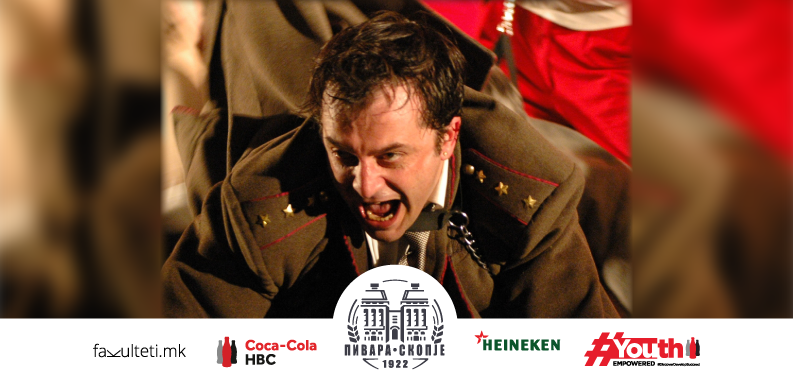
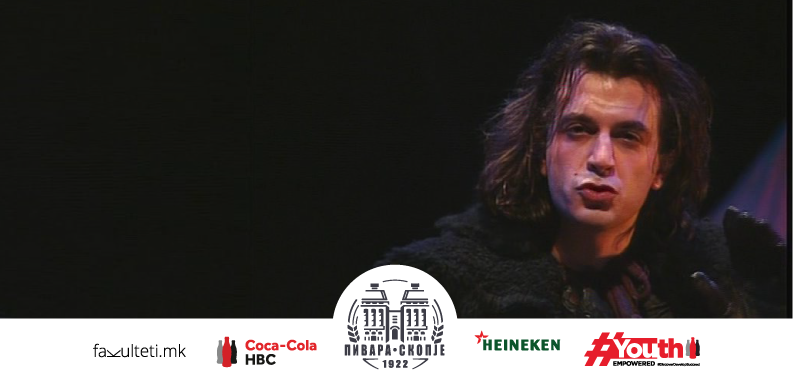
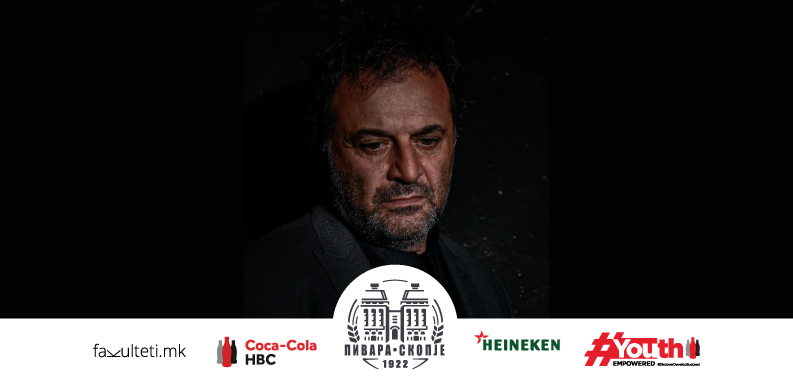
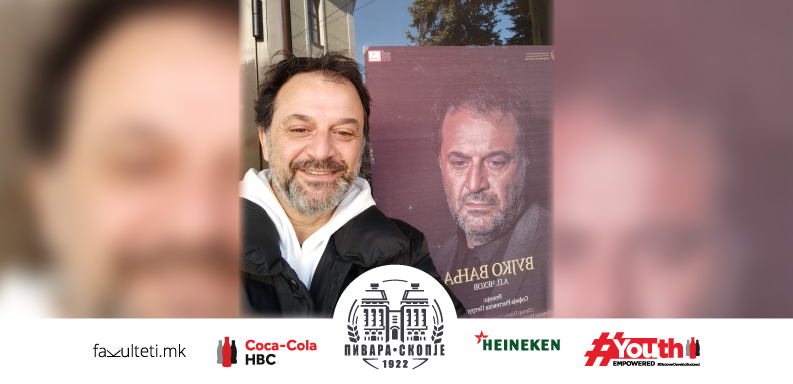
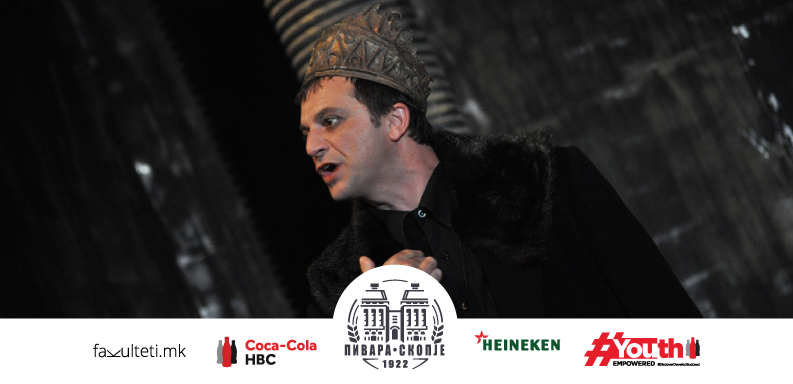
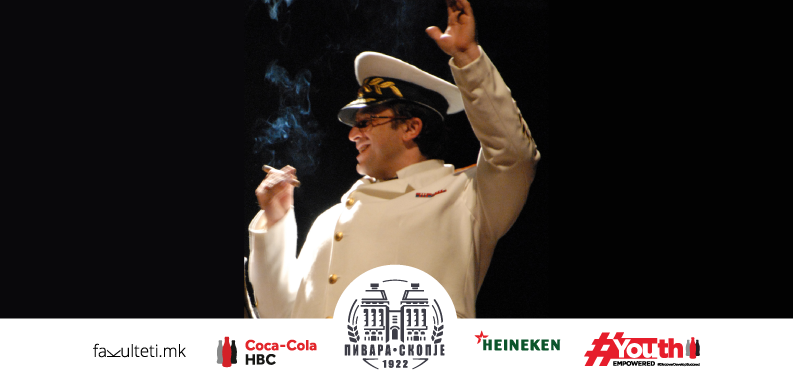
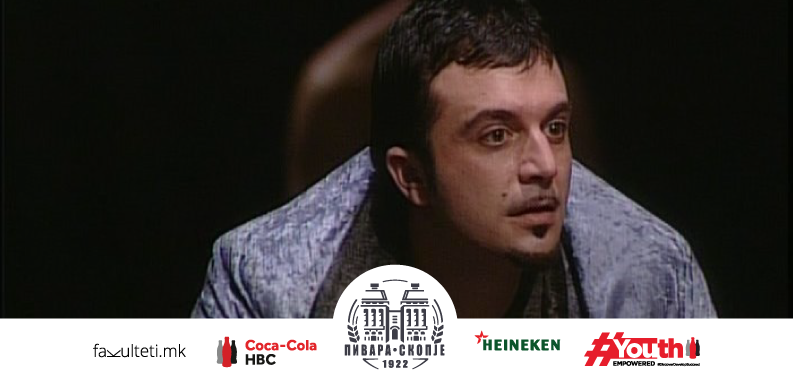
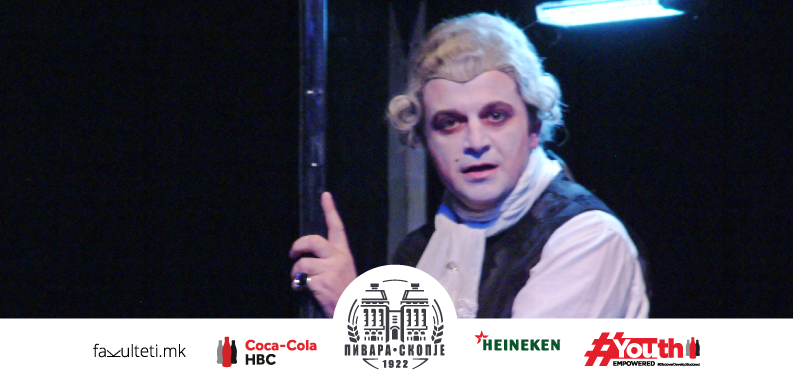
ON THE LADDER OF SUCCESS WITH PETAR GORKO: “THE STAGE HEALS IF YOU EXPERIENCE THE ACTING PROFESSIONS FROM THE BOTTOM OF YOUR SOUL”
Christian de Neuvillette in the play ” Cyrano de Bergerac”, then Macbeth, Henry the Sixth, then Henry the Eighth from Shakespeare, Tito in Branko Brezovec’s project… it is a long list of mostly leading roles played during the career of one of the most masterful actors of the Bitola and the Macedonian theater in general – Petar Gorko. This year, he marks the end of 3.5 decades of fruitful work on the theater stage, which he will celebrate in the fall through a joint performance with the Bitola Chamber Orchestra. During this period, he played about 100 roles, 40 leading roles, 19 roles only from Shakespeare’s works, over 2,000 plays. Without his accomplishments, the Bitola National Theater would be poorer for a top actor who plays every role equally well, giving himself unreservedly, and delighting the audience with his talent, charisma and dedication.
“Thirty-five years spent on stage is like a lifetime, full of beauty, discomforts, nervousness, passions, desires, hopes, disappointments, and virtues. Most importantly, the love for the theater does not pass or decrease. I enjoy the stage to this day, and I hope for many years to come,” says Gorko.
Babec encouraged him to go to the theater
His beginnings lead to the only former gathering place for children and youth in Bitola, the “Trajche Maglovski” Pioneer Center. He was in the recital section from the second grade, and his talent allowed him to be involved in events with the doyens of the Bitola National Theater even as a child.
“A wonderful period that brought me to performances with certain actors on the occasion of major holidays and the New Year. Some of them were Petar Stojkovski-Babec and Joana Popovska. Babec motivated me to come to the theater, and apparently, there were big mass plays with many child extras, and I became a part of almost every play. I had about 200 performances while I was enrolled at the Academy. The theater overwhelms you; you fall in love with it, and it becomes a part of your life. That’s what happened to me,” says Gorko.
He delivered a one-page long monologue from the Iliad in one breath
Even before he was ready to enroll, he had decided to study at the Faculty of Dramatic Arts. His parents were not too happy with that decision, but he was convinced he was choosing the right path. As a student, his professors changed – he started in the class of Vladimir Milchin, then Slobodan Unkovski, and graduated with Ljubisha Georgievski. This allowed him to learn from some of the best theater directors and acting professors, not only in Macedonia but also in the former Yugoslavia.
“Different approaches, methods, teachings, but all that was not terrible because my strong desire led me forward. I worked tirelessly, tried hard, and proved myself. Here’s one moment – I watched Zharko Laushevic in Milchin’s ‘Saint Sava’ delivering a monologue in one or two breaths. I was delighted and started to exercise. It was in the third year, when after a stage speech exam, we had the task of choosing a monologue from the Iliad. My monologue was one page, and I learned to deliver it in one breath. It was a great achievement then. More for me personally, few people noticed it, but for me, it meant discipline and maintenance of the speech apparatus, which I still cherish to this day,” says Gorko.
He got a job at the Bitola National Theater just four days after graduation
Although he wanted to work and create in Belgrade, his graduation coincided with the breakup of Yugoslavia. At the same time, the situation at home also changed, so he did not want his mother to remain alone. He got a job at the theater in his native Bitola together with two colleagues, Juliana Stefanova and Valentina Gramosli. They graduated on September 26th and got a job on October 1st, 1991, after only four days. He never regretted returning home and to his home theater.
After playing so many roles, he says that he finds himself in each of them, sometimes more, sometimes less, but he stands behind them all with his whole soul and body. He believes that honesty and love are the most important things with which he reaches the audience.
Acting is a demanding but noble profession
“The theater is life, which is not parallel, but intertwined with normal life. You study nonstop, read books, listen to music, always with a goal, for a specific role. It happens very often that I change my appearance, image for a role. We have a noble profession, pure psychotherapy if you experience it sincerely from the bottom of your soul. Many times, the stage heals, and it should be used in the most positive sense,” adds Gorko.
He admits that theater work is very difficult and quite demanding. There were times when rehearsals lasted all day, followed by a premiere in the evening, and instances of performing two shows in one evening or participating in theater projects that lasted for hours.
“But for a dedicated worker, it is not daunting. Different directors have different ways of working, both in terms of time and artistic approach. We’ve had productions where we worked literally all day, with rehearsals punctuated by small breaks for lunch and then back to work. It’s grueling, exhausting, but also brilliant. However, most directors prefer morning rehearsals, with the performance in the evening. For instance, one year I had 13 plays in the repertoire, with four of them featuring me in the leading role, all while simultaneously preparing for new productions. It was exhausting, demanding immense dedication and concentration. Especially when handling two plays by the same translator, the texts can blend in your mind. Of course, this happens mentally, not on stage,” says Gorko.
He had to act even when his loved ones were in the hospital
He experienced the happiest and most difficult moments on stage. The happiest moments were marked by successful rehearsals, delivering a well-played role, and receiving applause from the audience. The most challenging experience for him was when his son fell ill as a child, requiring urgent treatment in Skopje, yet he had to return to act in a play. At that time, the director told him, “The play will not be canceled; the child has a mother.” This situation also happened to two other actors.
The dedication and hard work brought him numerous awards from the jury of esteemed festivals, as well as recognition from audiences, media, foundations, and the Society of Writers. He also received the “4th of November” award from the Municipality of Bitola. His theater career took him almost all over the world. With the play “Tito,” he toured in Florence and Hamburg, and with “Henry the Sixth,” he performed in London and Beijing. Additionally, he embarked on tours in America and Russia, among other places.
“Everywhere we, the actors, recognize each other because of similar theatrical and life experiences. It’s an interesting phenomenon. As for respect, that varies depending on the country they live in, but politically speaking, we are the ministry that is mentioned last in the order of ministries,” adds the actor.
80 years of Bitola National Theater – the quality must be preserved for the next generations
He believes that theater can highlight problems in life and encourage certain processes.
“For the second time, a play was banned at the Bitola Theater – first ‘Mara’s Wedding’ and then ‘Tito’. It wasn’t the same each time, but it happens, influenced by certain individuals. Back then, they changed the Minister of Culture to demonstrate their disapproval of such occurrences. Later, we underwent a revolutionary change, if you recall, with the support of you and the audience, when we replaced two directors. Once again, it boils down to community and the determination to preserve the theater that previous generations entrusted to us, and which we must pass on to future generations. My perennial question has been – what kind of theater will we leave behind?”
“This year, the Bitola National Theater celebrates its 80th anniversary as the first theater in Macedonia performing in the Macedonian language. It’s not only the finest theater in Macedonia but also esteemed more broadly. Despite turbulent periods, I sincerely hope that we will pass it on to the younger generations,” says Gorko.
Zhaneta Zdravkovska









